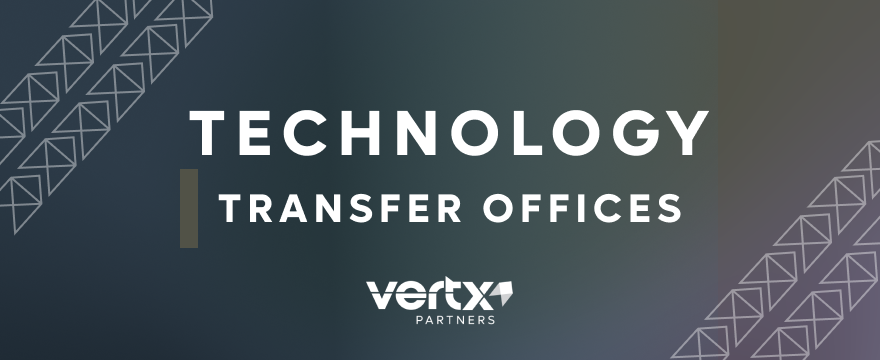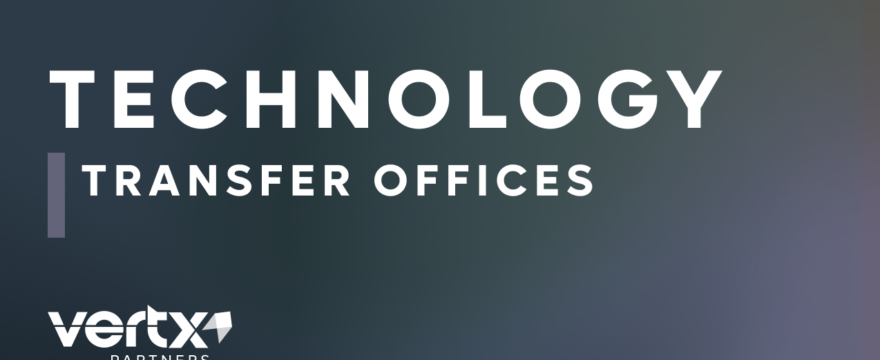Technology Transfer Offices (TTOs) play an essential role in the early stages of the SBIR/STTR process, and a successful relationship is critical for success.

As businesses begin the phases of the Small Business Innovation Research (SBIR) and Small Business Technology Transfer (STTR) programs, they may encounter challenges transitioning their innovations from the laboratory to the marketplace. In Phases I & II, as commercialization starts to become more important, Technology Transfer Offices (TTOs) emerge as indispensable allies. This article explores the pivotal role TTOs play and why they’re a valuable resource for businesses navigating the complexities of SBIR/STTR projects.
What Do Technology Transfer Offices Do?
Technology Transfer Offices (TTOs) are specialized entities within academic institutions, research organizations, and government agencies dedicated to facilitating the transfer of technologies from research settings to the commercial sector.
Their primary mission is to bridge the gap between innovation and practical application, ensuring groundbreaking discoveries and inventions reach the market. In the end, this benefits both the market and entities involved.
The commercialization process involves translating research outcomes, often resulting from Phase I and Phase II SBIR/STTR projects, into tangible products, services, or processes with real-world applications. TTOs act as catalysts, fostering public, private, academic, and non-profit collaborations.
Here’s a short list of Appalachian Technology Transfer Offices that may be useful to you:
- Marshall University’s Technology Transfer Office
- West Virginia University’s Office of Innovation & Commercialization
- Appalachian State University’s Office of Research & Innovation
- Ohio University’s Technology Transfer Office
- University of Pittsburgh’s Office of Innovation & Entrepreneurship
Assessing Markets for Commercialization
One key area where TTOs excel is in assisting businesses with market assessment and commercialization planning. TTO professionals leverage their expertise to analyze market trends, identify potential competitors, and evaluate the commercial viability of technologies developed during initial SBIR/STTR phases. This strategic guidance helps businesses refine their commercialization strategies and navigate the complexities of bringing a product to market.
IP Management & Licensing
Intellectual property (IP) is a cornerstone of tech development. Because of this, TTOs play a crucial role in managing and safeguarding it.
Before Phase III, businesses may encounter complex IP considerations, and TTOs help navigate these waters. They assist in securing patents, copyrights, and trademarks. TTOs also negotiate licensing agreements that allow businesses to utilize or commercialize the IP developed through SBIR/STTR projects.
Connecting with Industry Partners
TTOs connect businesses with potential industry partners, investors, and collaborators. These connections are invaluable as businesses gear up for Phase III when scaling up and bringing products to market often requires additional resources and expertise.
TTOs leverage their extensive networks to facilitate collaborations that enhance the commercialization prospects of SBIR/STTR-developed technologies.
Identifying Funding Opportunities
Recall that funding sources change as businesses progress through the three phases of the SBIR/STTR program.
The journey from research to commercialization requires additional financial support, and TTOs are well-versed in identifying and securing funding opportunities. They guide businesses in exploring various funding sources, including government grants, private-sector investments, and industry partnerships. This financial support is crucial for sustaining the momentum gained during SBIR/STTR phases and ensuring successful implementation.
Regulatory Guidance & Compliance
SBIR/STTR projects often involve navigating complex regulatory landscapes. TTOs provide invaluable guidance on regulatory compliance, helping businesses understand and adhere to federal acquisition regulations, export controls, and other industry-specific standards. This assistance ensures businesses can confidently move forward with projects without encountering regulatory obstacles.
For more information on SBIR/STTR regulatory compliance, visit our Vertx guide.
Training & Monitoring
In the field of technology transfer, knowledge is power. TTOs offer training and educational programs to researchers and entrepreneurs involved in SBIR/STTR projects. These programs enhance participants’ understanding of technology transfer processes, commercialization strategies, and the intricacies of the SBIR/STTR program, empowering them to make informed decisions throughout their journey.
Additionally, as businesses gear up for Phase III, TTOs help monitor progress and assist businesses in meeting reporting and compliance obligations. This proactive approach ensures that companies stay on track, fulfill contractual requirements, and are well-positioned for continued success in the later stages of the innovation lifecycle.
TTOs: Crucial SBIR/STTR Assets
During the SBIR/STTR process, and as the focus shifts from research to commercialization, the support of Technology Transfer Offices is a game-changer for businesses. TTOs bring a wealth of expertise in market analysis, IP management, regulatory compliance, and industry connections, all of which are crucial for successfully transitioning innovations into the marketplace.
However, as businesses begin navigating the challenges of Phase III, partnering with TTOs can have its limits. This is where Vertx Partners can assist. With a large team of seasoned federal contracting veterans, Vertx offers custom consulting services to any business looking to make the transition from Phase I & II SBIR/STTRs into the coveted Phase III award.
Vertx Partners specializes in assisting businesses navigating the SBIR/STTR process. Contact Vertx today for a free consultation on connecting with your regional TTO, or moving forward with your SBIR/STTR project.
